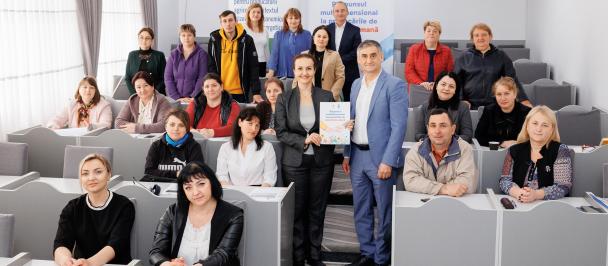With Austria and UNDP support, Moldova rehabilitates its hydro-infrastructure, to mitigate vulnerability to climate hazards
March 27, 2024

The Republic of Moldova will strengthen its resilience to the intensifying climate-related extreme weather events, such as floods and flash floods, that cause loss of life and property damage. The Austrian Development Agency (ADA), the operational unit of Austrian Development Cooperation, provides a total of about €4 million to build the national hydro-meteorological monitoring and early warning systems and to apply an integrated water resources management approach to five key watersheds. The funds are offered through UNDP, via "Hydro-infrastructure rehabilitation to mitigate vulnerability to climate-driven extreme events in the Republic of Moldova" project, which will be implemented until the end of 2027.
“Climate change is projected to increase the occurrence of intense rainfall events in Moldova with potential consequences for damaging flooding, given the country’s rolling topography and current land use patterns. The new project that we are launching today will put in place knowledge, capacity, infrastructure, policy, and regulatory frameworks to enable a long-term impact of the country's enhanced capabilities to manage the run-off from extreme climate-driven rainfall events to prevent flooding," emphasizes Gunther Zimmer, the Head of the Austrian Development Agency’s office in Chișinău.
“We are delighted to start a new project with Austria to improve disaster risk management, building on the success of a previous initiative that piloted rainwater collection basins as an efficient climate change adaptation measure. Another result was setting up community volunteer firefighters’ posts reducing the response time of fire extinguishing interventions. These posts provide services to 65 communities with a population over 60,000 people. Going forward, we will contribute to flood risk mitigation for at least 65,000 people in target areas who are directly exposed to flood hazards,” noted Daniela Gasparikova, UNDP Resident Representative to the Republic of Moldova.
As the climate-driven vulnerability of rural inhabitants is largely dependent on the integrity and functionality of the dams and dykes along watercourses in Moldovan watersheds, the project will carry out an analysis in each of the 5 pilot zone (Copăceanca, Soloneț, Bahu, Ialgug and Lăpușna), identifying infrastructure at high risk of failure and defining remedial measures.
A flashflood/flood forecasting early warning system will be designed and implemented in the pilot areas considering the different processes and the existing flood risk. For that, three meteorological stations and five hydrological stations will be acquired, deployed and included in the existing monitoring network.
The project will support amendment of the regulatory framework supporting the safe operation of the hydro-infrastructure in Moldova: methodologies, protocols, and standards.
At the local level, the five benefiting communities will be assisted to put in practice participatory watershed management plans focusing on flood risk reduction. Small grants will be offered for activities like reforestation, wetland restoration, soil conservation, agroforestry demonstrations, etc.
The "Hydro-infrastructure rehabilitation to mitigate vulnerability to climate-driven extreme events in the Republic of Moldova" project is a continuation of an innovative initiative that was implemented previously by UNDP, with the financial assistance of the Austrian Development Agency (ADA) and Estonia. On the one hand, the interventions were focused on building several community volunteer firefighters posts in the most vulnerable districts of the country with a high risk of fires, while on the other hand — on building rainwater collection basins.

 Locations
Locations



